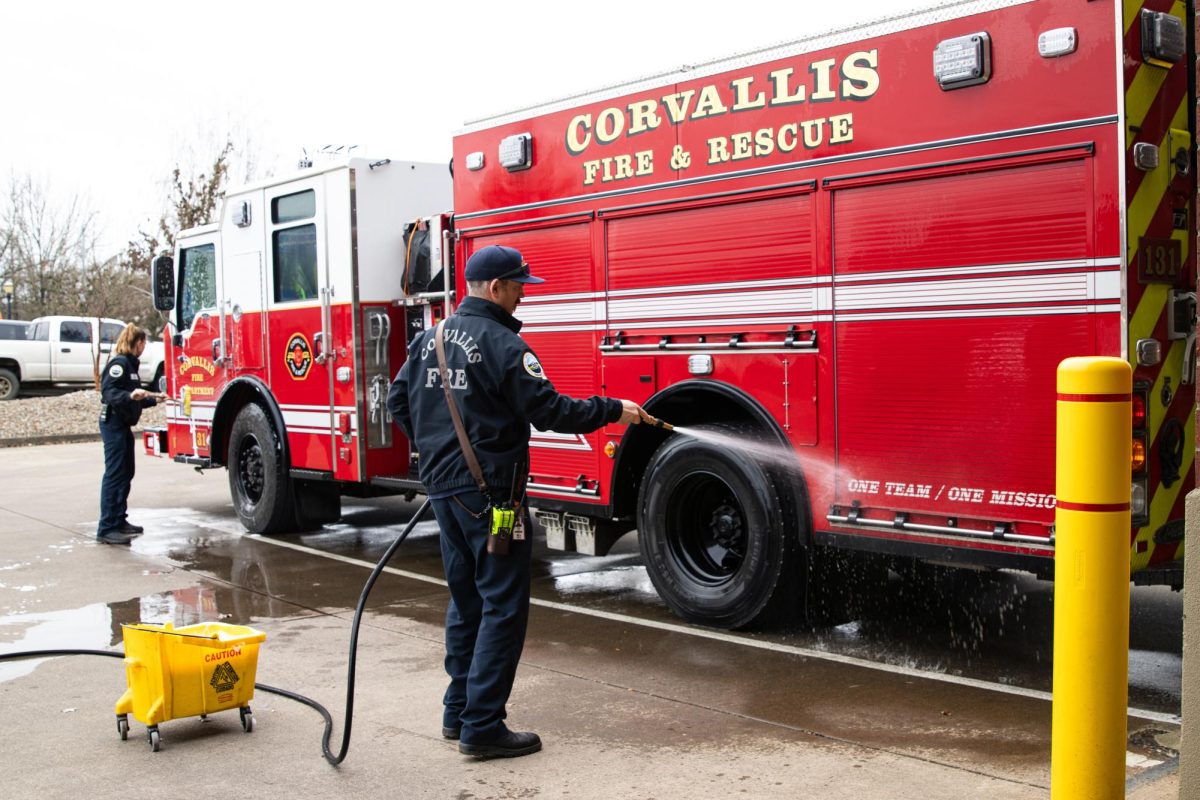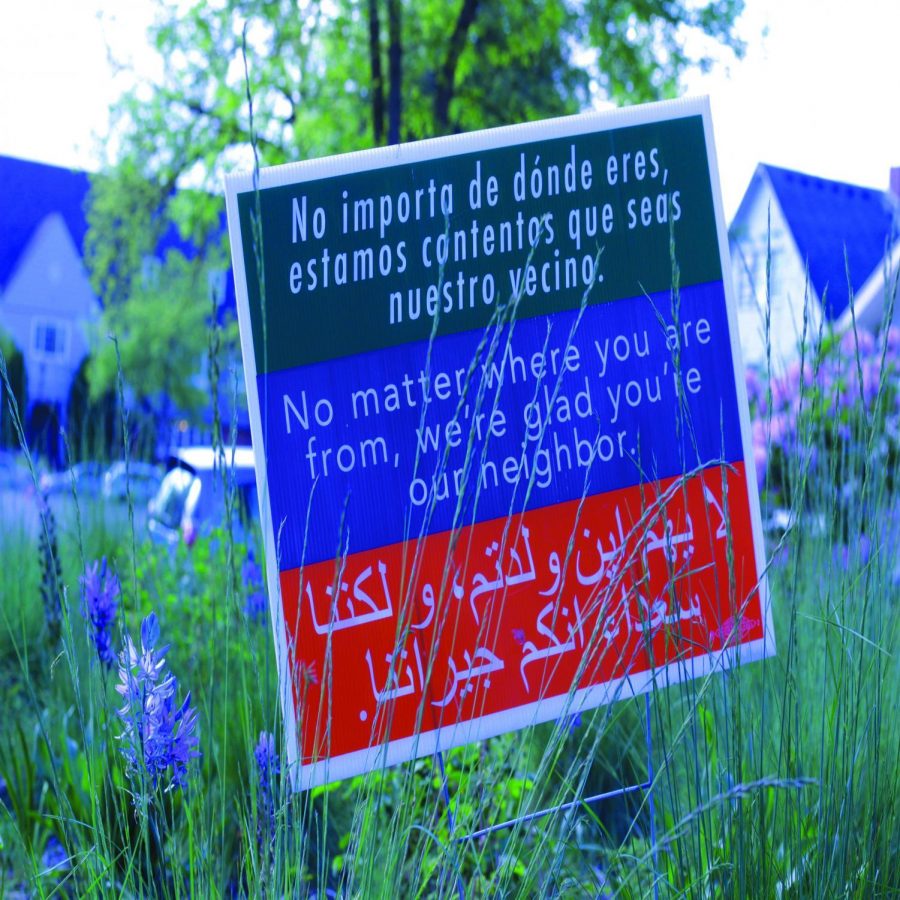Religious studies program sees increase in non-religious students
May 7, 2018
Community members call for increased recognition of different religions from university.
Among adults in Oregon, 68 percent of people identify as participants of a major religion, according to Pewforum’s 2016 survey.
Being a university that is home to both domestic and international students, as well as a religious studies degree, Oregon State University’s student body represents a number of world religions, each with their own customs and traditions.
Eliza Young Barstow, a history and religious studies instructor, has noticed an interest in religious studies among students at OSU, alongside an increase in non-religious identifying students.
“There’s this category that’s used by scholars of religion—the ‘nones:’ atheists, agnostics, people that practice some combination of religions and but don’t feel affiliated with any particular tradition. They’re the fastest growing category, and are very significant on this campus,” Barstow said. “I think this leads to even more interest in religion on campus, in terms of religious studies classes, because a lot of students are wondering, ‘What is this religion thing and why do people do it?’”
Courtney Campbell, the hundere chair in the Philosophy Department, has surmised that a majority of the religious studies major is comprised of ‘nones;’ students with no religious affiliation.
“Most of our religious studies students are similar to Oregonians, and especially the millennial/generation Z cohort, considering themselves spiritual, but not affiliated necessarily with a specific religious tradition,” Campbell said in an email. “Our religious studies program thus has students who identify with no affiliation (the largest denomination in Oregon), with Buddhism, with new age religiosity and with spirituality, some who identify with Catholicism, some with Islam, and others with atheism.”
This increase in non-religious backgrounds has lent itself to a blank slate of understanding for students, Barstow said.
“Unlike many universities in the country, the dominant religion here is no religion, because it is the Pacific Northwest, and so when I teach, I can take for granted that a sizable number of students know biblical stories,” Barstow said. “In many places I’ve taught in, not everyone’s Christian, but many grew up in homes with some level of Christian connection, so you could just refer to Genesis stories and people generally knew them. For a lot of students here, that’s simply not the case.”
OSU, being a public, state-funded university, doesn’t have a campus religion, and so does not have a requirement for religious studies or theology, according to the OSU baccalaureate core requirements.
“Religious studies doesn’t teach students to be religious or spiritual, it is engaged in critical academic study about religion, so the religious background, or lack of, of our majors and minors (students) is not our focus,” Campbell said in an email. “That’s one of the differences between religious studies at a public university, like OSU and religious studies programs at religious-affiliated schools, such as University of Portland, Gonzaga or Pacific Lutheran.”
Despite the growing population of non- religious students, there are still students at OSU who identify as religious and actively practice their religions, Campbell said.
“I think we have enough diversity that we could do more to call attention to the diversity on campus. There are a lot of specific groups for
students, like the Muslim Student Association, or the Newman center for Catholic students,” Barstow said. “ But I would like to see more effort in collaboration on campus to create religious awareness.”
Michael Chea, a biohealth sciences student, personally identifies as a Buddhist and practices his religion by wearing a representational necklace and bracelet, and maintaining a shrine in his room.
“I don’t have the chance to go to a temple anymore and I had to make my shrine even smaller,” Chea said in an email regarding how his religious practices have changed since beginning at OSU.
Campbell said that the university has more work to do in acknowledging religious diversity on campus.
“I have had several students tell me on occasion that they do not feel comfortable raising a religious perspective in the classroom setting,” Campbell said in an email. “They are concerned that they will be stereotyped as the religious student or the God student, so they often are silent when they would have much to offer to a campus and a learning environment that purportedly prides itself on its diversity, openness and inclusiveness.”
Chea said he has not seen anything pertaining to the Buddhist religion, not just on campus, but in Corvallis as a whole.
“The best way I think it could be represented is having resources known for students, just because when I got here I didn’t know anything that was available to me,” Chea said in an email. “It is tough to try and combine religion and the campus just because I know there would have to be equal representation for all the religions and also the fact that it can be an area of dispute for some people.”
A way to acknowledge religious diversity at OSU is to educate faculty and students about religious awareness, Campbell said.
“Each academic year the university circulates to all faculty and staff its guidelines on accommodations for students with religious beliefs; that’s a proactive effort on the part of the university. However, it doesn’t address all concerns,” Campbell said in an email. “We have been approached by Muslim students about trying to secure a private, safe place for students to engage in their daily prayers. It’s odd that, for example, despite the deep-rooted nature of yoga practice in the Hindu religion, we don’t give a second thought to students carrying a yoga mat to class, but for similar religious practices, it can seem like the campus is less welcoming, whether it be prayer, or female students wearing hijab.”
According to the OSU Religious Accommodation of Students policy, the university may not promote or insinuate that it favors religion over non-religion, or one religion over another. The policy additionally states that it is based on respect for students’ right to choose and practice their religions freely, so long as the practice is not against public safety, health and the human rights and freedoms of others.
For students who have religious-based dietary needs, Tara Sanders, the University Housing and Dining Services dietitian, coordinates with such students in order to provide them with meals that fit their needs.
“UHDS’ most prevalent religious dietary need is serving Muslim students and guests who practice a Halal diet and abstain from foods containing pork and alcohol, or who may only consume Halal-certified meats,” Sanders said in an email. “Additionally, UHDS’s Cascadia Market offers religious dietary options, including Halal and Kosher frozen meals.”
Sanders also assists students in navigating the ingredients of the prepared foods in the dining halls.
“We recognize that transparency in ingredients and preparation is very important for individuals with specific dietary needs,” Sanders said in an email. “All UHDS dining centers have nutrition kiosks that list ingredient and dietary preference information so students can make selections that meet their diet needs.”
Although some religious-based needs for students are being met, Shreyans Khunteta, the president of the Advocates for Freethought and Skepticism student group, would like to see the university bring in speakers to expand conversations around faith or the lack of it.
“I think it would be interesting if the university brought speakers that talked about religious issues, and came from a variety of faiths or lack of faiths,” Khunteta said. “They could have events around that.”
Khunteta believes that the university should be predominantly neutral in its religious observances.
“I think, as a public university, things should be kept pretty secular. It shouldn’t go one way or the other in terms of religion at all,” Khunteta said. “If I have any one complaint, it would be that we observe a lot of Christian holidays, but there aren’t too many observed holidays for other religions. It would probably get really complicated with so many holidays for so many religions.”
While the university does not observe all holidays from all religions, there is a protocol in place for students to be excused from classes and allowed to make up assignments and exams during holidays in their religion, the most common being Yom Kippur, Rosh Hashanah, Ramadan and Eid al-Fitr.
Campbell wants to see more openness in conversations about religion, as he believes it enriches learning environments between students.
“There is a need for all of us to keep working to ensure that our classrooms, and student experiences, are open to all perspectives, religious, secular, irreligious, anti-religious, etc,” Campbell said. “Students should never feel the classroom or campus environment is such that they need to be ‘silent’ about a key feature of their identity, in this instance, a religious or spiritual-based conviction.”


















































































![Newspaper clipping from February 25, 1970 in the Daily Barometer showing an article written by Bob Allen, past Barometer Editor. This article was written to spotlight both the student body’s lack of participation with student government at the time in conjunction with their class representatives response. [It’s important to note ASOSU was not structured identically to today’s standards, likely having a president on behalf of each class work together as one entity as opposed to one president representing all classes.]](https://dailybaro.orangemedianetwork.com/wp-content/uploads/2025/03/Screenshot-2025-03-12-1.00.42-PM-e1741811160853.png)
























